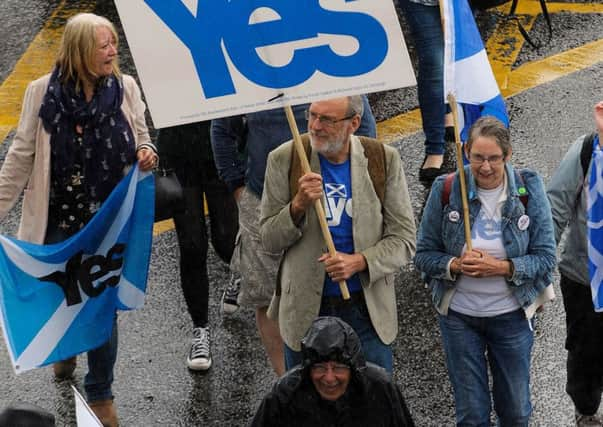Euan McColm: Mind your language should be indyref2 watchword


One version – the one told most frequently by those who voted Yes to the break-up of the United Kingdom – is that the whole thing was a prolonged jamboree, the sun shone brighter, flowers smelled sweeter, and the nation came together in a joyous celebration of democracy.
The other version – recalled by No voters – is that Scotland was bitterly divided by a campaign that descended into bitter recrimination. They remember the anxiety of fighting a political battle that they hadn’t started.
Advertisement
Hide AdAdvertisement
Hide AdGiven the belief of Scottish nationalists that referendums represent the most fun you can have in public without attracting the attention of the police, it was perhaps unsurprising when First Minister Nicola Sturgeon insisted, during a speech to the Political Studies Association, that indyref2 needn’t be divisive. Sturgeon would lead by example. After all, she added, the Scottish Government has a special responsibility to build consensus where it can.
Those who did not find 2014’s campaign to be a carnival of delights may have heard the First Minister say it was necessary to recognise the honesty and validity of people’s anxieties, doubts and differences of opinion and believed that the next referendum might be different. Some people are trusting like that.
Sturgeon’s carefully considered speech was, certainly, a welcome contribution to a constitutional debate that is already fractious. But wise words are only of any value if people pay attention to them.
It quickly became clear that some senior SNP figures had no intention of proceeding in the way the First Minister had described.
Frank Ross, the SNP group leader in Edinburgh and favourite to be the next head of the city’s council injected an unhealthy dose of othering into the political discourse. Pro-Union parties, he suggested, only call themselves “Scottish” as part of a branding exercise to win votes. In an entertainingly preposterous piece for the Edinburgh Evening News, Ross wrote: “The Scottish Conservative and Unionist, Scottish Labour and Scottish Liberal Democrats all have one thing in common. None of these organisations actually exist – are you surprised? These names on leaflets and on the ballot papers you are asked to mark with your democratic preferences, are descriptions which have been registered purely for use at elections. That is, they are brands.”
This is base stuff. An especially ugly aspect of the last referendum campaign was the frequently levelled charge from some nationalists that those who supported the maintenance of the UK were not “real” Scots. Once we get into that territory, we’re only a step away from talk of “quislings” and “traitors” and “you’ll-be-first-against-the-walls”.
Ross later insisted he was not questioning the Scottishness of his political opponents, merely why unionist parties used the word Scottish in their names. Make of that load of weasel-worded rubbish what you will.
Ross was not the only nationalist politician to have demonstrated a tin ear when it came to the First Minister’s words. Dependably – some might even say predictably – Pete Wishart MP blundered in with a typically charmless contribution.
Advertisement
Hide AdAdvertisement
Hide AdIf you want to know quite how turbulent are the times in which we live, you should consider the fact that Wishart – formerly the keyboard player in Runrig – is chair of the Scottish Affairs Select Committee in the House of Commons. Wishart, a man in the great tradition of bores who mistakenly consider themselves great wits, is regularly to be found tweeting opinions about those who oppose independence. His most recent addition to his works is a graphic that describes the degrees to which unionists are “wankers”.
A sense of proportion is required – Wishart’s apparent endorsement of piquant language to describe opponents is, on the face of things, a matter of little consequence. But it does reveal a disdain for those who hold different opinions that can only become sharper as the campaign for the next referendum heats up. This nastiness travels both ways in the battle over the constitution. A number of unionist politicians tell me that, during campaigning for next month’s council elections, they have been struck by the venomous language used by some unionist voters when discussing Nicola Sturgeon.
This is, one senior unionist MSP tells me, something that No campaigners will have to keep an eye on. During the first referendum campaign, the pro-independence side was – and you will have your view of whether this is fair or not – blamed for the majority of the online abuse that helped create that unique “party” atmosphere. Next time around, we should not be surprised if unionists display just as little self control.
The First Minister may say the next referendum campaign need not be divisive but the constitutional question has already created division; the old arguments of left versus right have been replaced by a new identity politics that inflames passions. A second referendum will only bring those passions to the boil.
A binary referendum is, by its very nature, divisive and no number of soothing words from the First Minister can change that reality.
But while nobody can prevent an inherently divisive process from being divisive, Sturgeon and other senior politicians can try to keep things as civil as possible. This should mean – for all parties – that candidates and campaigners whose behaviour falls below the standards described by leaders in speeches about respect are subject to disciplinary measures.
If the First Minister – or any party leader in Scotland – is serious about ensuring indyref2 is carried out in an atmosphere of tolerance and good faith then a zero tolerance approach to abusive behaviour is the bare minimum required.
Sturgeon is wrong to say the next referendum campaign need not divisive. Of course it will be.
The question is just how much long-term damage these divisions will cause.